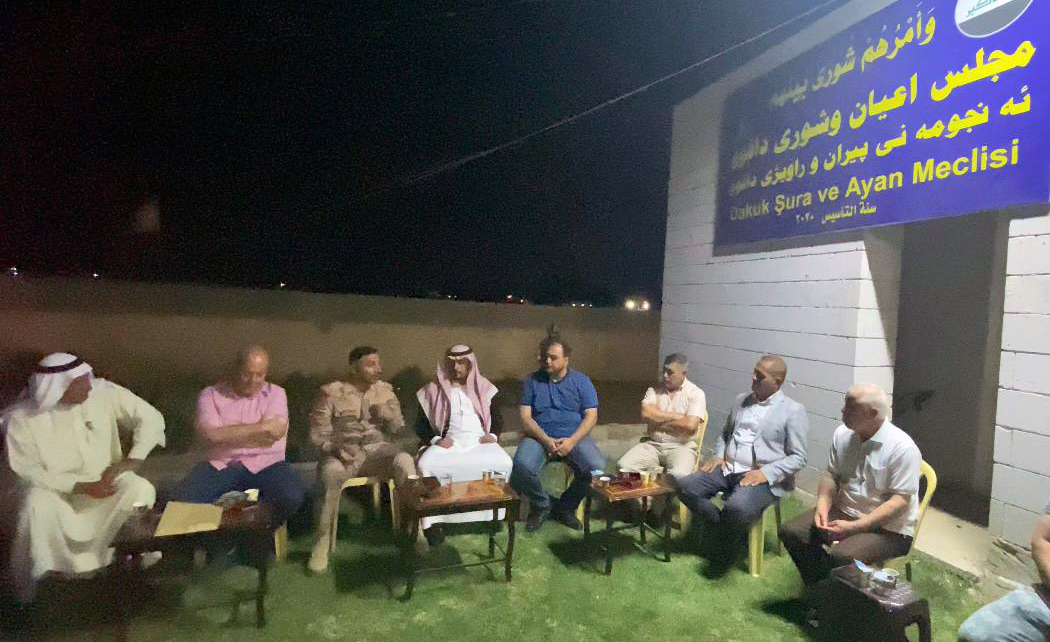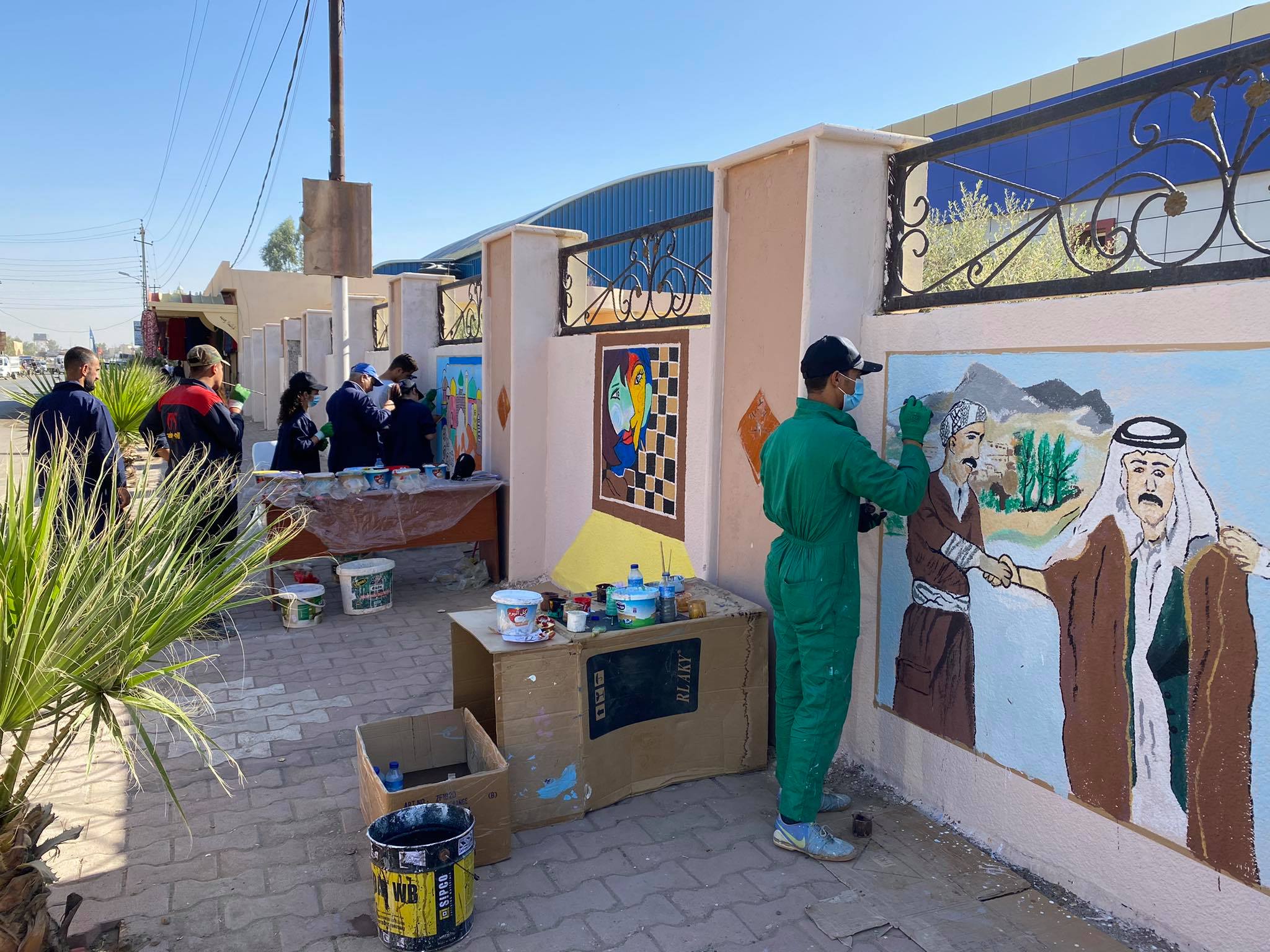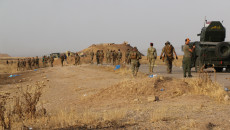Whenever any problem arises in Daquq and ahead of posing any threats to coexistence in the multiethnic and religious district, the local council of the senates (the notables) strives to put a peaceful end for it.
The council has been founded about a year ago representing all the ethnicities of Daquq district, 44 km south of Kirkuk. Its 12 members are well-known figures from Arab, Kurdish and Turkmen tribes following the threats by the turbulent security and disputes over agricultural lands.
“One of our missions is follow up for the problems the locals face to solve it peacefully unanimously in the spirit of one team since we have a long history of cohabit and the circumstances require such an approach,” said Abbas Hamdi Bagtash, a Turkmen figure in the region and head of Daquq Senate Council.
Our vision is that the ethnicities in Daquq want peace, preserve history of coexistence and social ties.
The district of Daquq is home to over 97,000 Turkmen, Arabs and Kurds, Sunni, and Shiite Muslims, and Kaka’is as well. Its part of Kirkuk province and one of the disputed territories between Baghdad and Erbil.
Lately, the region witnessed a severe dispute over ownership of agricultural lands.
The origin of the landownership disputes goes back to when agricultural lands belonging to Kurds and Turkmens in Kirkuk and some other disputed areas in other provinces were distributed among Arabs from central and southern provinces of Iraq under the rule of the Ba’th regime. Most of the Arabs who were settled there left after the fall of the Saddam regime in 2003.
The land confiscation and their redistribution to Arab farmers was part of the ‘Arabization process’ and was directly ordered by the regime’s ‘Revolutionary Command Council’, which had legal powers.
Last November, an agreement was signed between the Arab and Kurdish farmers that 18,5 square kilometers (1,850 hectare) of agricultural lands not to be cultivated by either side for the time being.

Kirkuk, June 2021- Meeting of Daquq Senate Council in presence of Iraqi army commander of Daquq district. KirkukNow
The council founded in 2020, has 12 key members supervising 12 committees for all sectors. The head of council is circulated quarterly.
“Our main goal is preserving peace and coexistence in Daquq so once a problem occurs, we try to solve it in a peaceful way” said Zahir Bakir, a Kurdish member of the council.
The council meets biweekly to discuss pending issues. Last meeting mid-June hosted Colonel Hamza Fouad, commander of Brigade 45 of Iraqi army, in charge of the security of Daquq.
“In the meeting we have offered him several proposals to stabilize the region including a security checkpoint south of Daquq to avoid security gap,” said Rafid Jalal, a Turkmen figure and member of the local advisory council.
The commander promised to do his best to secure Daquq by deploying more forces in Daquq.
“We want message of fraternity and coexistence to prevail hatred speech.”
One of the threats Daquq encountered was retaliation and confrontation among the ethnicities following ISIL control over part of Kirkuk suburbs and almost one third of Iraq. The efforts aim at deleting the aftermath of the brutal.
Hassan Hilal, a tribal chieftain of al-Boufaraj tribe said, “We want message of fraternity and coexistence to prevail hatred speech.”
“Our efforts are directed at all ethnicities, sects and religions to respect the privacy of each other and avoid tension and complications, he added.
The sleeper cells of so-called Islamic State in Iraq and Levant ISIL lately escalated moves targeting Kaka’i civilians and Iraqi forces. In Mid-March, a soldier of Iraqi army was killed and another injured when "ISIL sniper" targeted Iraqi army brigade in the villages of Mora and Ban Shakh, southwest of Daquq district of Kirkuk Northern Province.
Early March, Tens of ISIS hideouts destroyed and several militants killed in an air-land operation by Iraqi forces in three disputed areas. Following escalation of ISIS attacks in February killing over 15 members of Iraqi forces and tens injured, a wide range of operations launched in Khanaqin, Daquq and Duz Khurmatu disputed territories.
“Any decision taken by the council is approved followed by all components,” said Hilal, member of the council which embraces Muslims, Sunnis and Shiites, and Kaka’is as well.

A group of Kurd, Arab and Turkmen political parties support the council and its mission by participating in its bimonthly meetings.
Despite the turbulent security, occasionally feud over lands escalate to confrontation between Kurds and Arabs.
The council have addressed relevant authorities to take the issue to court in order to put a legal end to the feud.
Kurds, whom controlled Kirkuk up to October 2017 when the so-called Islamic State ISIS was ousted by Iraqi forces, wanted Kirkuk to become part of the Kurdistan region through a referendum for independence, which has been opposed by the Arab and Turkmen populations.
“We have a bright history of fraternity and now it’s the duty of all of us to preserve this brotherhood,” Hilal optimistically said.






